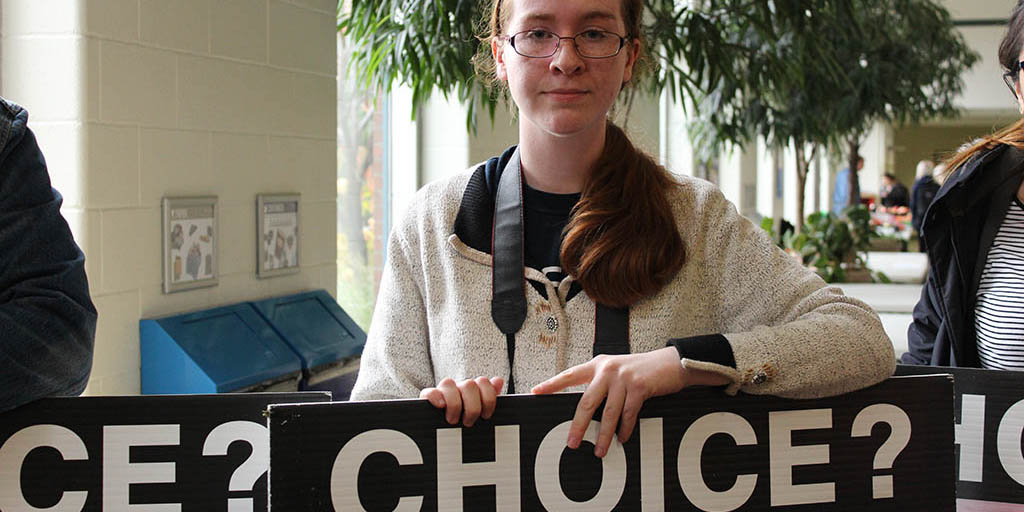What all students should know about Ford's mandate for free speech policies
 CREDIT: MELISSA NOVACASKA
CREDIT: MELISSA NOVACASKAFord's mandate for province-wide university and college free speech policies will give controversial groups, such as London Against Abortion, the freedom to express their beliefs on campus without repercussion.
What is the mandate?
On Aug. 30, Ontario Premier Doug Ford announced his mandate for all post-secondary institutions in the province to design, implement and enforce campus-wide free speech policies by Jan. 1, 2019.
The policies must meet the provincial government’s minimum standards of free speech. Once in place, colleges and universities must annually report the progress of their policies to the Higher Education Quality Council of Ontario.
Institutions that do not comply with this mandate may receive a reduction in operating grant funding, and students violating the policies will be disciplined by their schools.
“Colleges and universities should be places where students exchange different ideas and opinions in open and respectful debate,” Ford said in an Ontario government news release titled “Ontario Protects Free Speech on Campus”.
A backgrounder for the policy, entitled “Upholding Free Speech on Ontario’s University and College Campuses” provides some of the specifics. The policies are required to include a definition of freedom of speech, and principles based on the University of Chicago Statement on Principles of Free Expression that say:
• Universities and colleges should be places for open discussion and free inquiry.
• The university/college should not attempt to shield students from ideas or opinions that they disagree with or find offensive.
• While members of the university/ college are free to criticize and contest views expressed on campus, they may not obstruct or interfere with the freedom of others to express their views.
• Speech that violates the law is not allowed.
What’s behind the mandate?
The months leading up to Ford’s campaign saw several highly publicized protests at Canadian campuses over the presence of controversial speakers or professors.
One of the most well-known protests took place at Wilfred Laurier University, after teaching assistant Lindsey Shepherd was reprimanded for playing a clip of Jordan Peterson arguing against the use of gender- neutral pronouns.
Peterson, a professor at the University of Toronto, has stirred national and international controversy for his role as a figurehead of what has been dubbed the Free Speech Movement.
As part of his spring election campaign, Ford promised he would tie post-secondary funding to free speech, saying too many schools had been placing limitations.
What does the mandate mean for Fanshawe students?
While the ultimate outcome of the mandate remains to be seen, debate has been sparked over where the line between free speech and hate speech lies in educational environments meant to provoke thought – in other words, environments meant to make us learn by feeling uncomfortable with our preconceived notions.
Political analyst and Fanshawe College interdisciplinary professor Matt Farrell said that although students attend college to move out of their comfort zones, they are nevertheless bound by the unwritten rules of social norms that supporters of the Free Speech Movement seek to change.
“You don’t share that racist thing that you want to say in the workplace. You act civil to your co-workers, and that’s a norm,” Farrell said. “The norm is you keep your inflammatory opinion to yourself because we have to work together.”
Farrell explained that these norms are potentially shifting, due in part to the anonymity of social media and the influence of powerful leaders like Donald Trump.
“[Some] people want to share their unpopular opinions and do so consequence free,” Farrell said.
Although Farrell maintained that students should always appreciate different viewpoints to have a full understanding of the issue at hand, it’s also important to realize all objections or dissenting opinions aren’t inherently worthy of praise.
“Sometimes a claim isn’t popular because it’s wrong, or there’s evidence to the contrary yet the person is still worthy of respect,” he said. “Freedom of expression means you are free to express your views; it doesn’t mean you are entitled to an audience.”
Farrell advised that students continue to treat school like any other formal workplace, before and after the policy deadline.
“Be respectful to your classmates – it makes for a better learning experience,” he said. “I try to tell students to approach each problem like you may not have the right answer. In fact, sometimes there isn’t a right answer – just different approaches.”
The Interrobang was able to reach out to the Office of the Minister of Training, Colleges and Universities, but a comment was not returned before this article’s publication date.
















